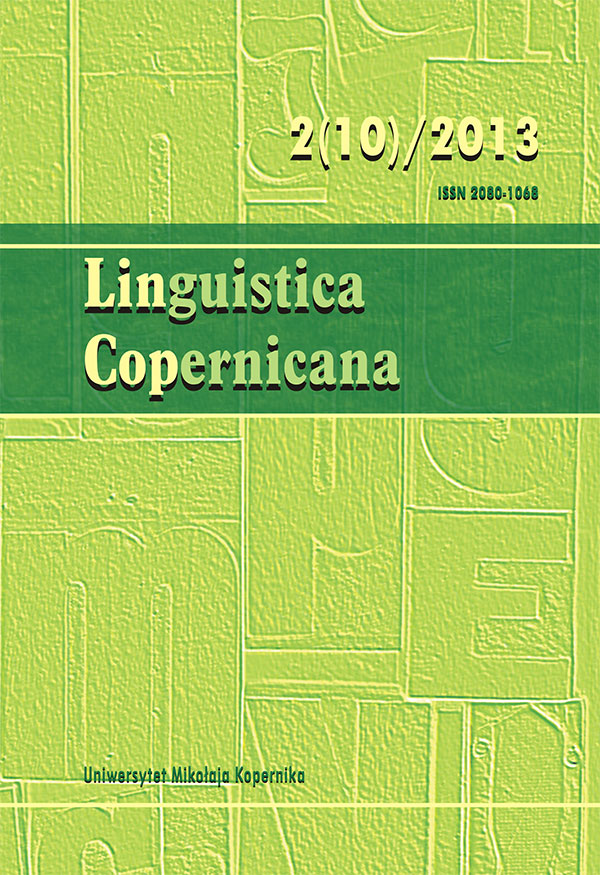Parole potentielle w teorii Ferdinanda de Saussure’a
DOI:
https://doi.org/10.12775/LinCop.2013.022Słowa kluczowe
język, językoznawstwo, teoria, langue, parole, parole potentielleAbstrakt
Artykuł ma na celu przybliżenie kompletniejszej wizji dualności langue / parole wyłaniającej się z oryginalnych pism de Saussure’a, przy czym szczególny nacisk położony jest na pojęcie parole potentielle, które wypełnia częściowo „przestrzeń pośrednią” między systemem języka a materialną (dźwiękową) formą jego użycia. Konsekwencją tego pogłębionego spojrzenia na podział langue / parole jest również sprecyzowanie saussurowskiej koncepcji epistemologii językoznawstwa, która, jak się okazuje, jest bardzo zbieżna z teoriami zaproponowanymi w XX wieku przez interpretatorów i kontynuatorów myśli genewskiego lingwisty (L. Hjelmslev, G. Guillaume, E. Coseriu, F. Rastier), mającymi w założeniu wykroczyć poza saussurowską „dychotomię”.
Bibliografia
BOUQUET S., 1997, Introduction à la lecture de Saussure, Payot: Paris.
BOUQUET S., 1999, La linguistique générale de Ferdinand de Saussure: textes et retour aux textes, [online:] http://www.revue-texto.net/Saussure/Sur_Saussure/Bouquet_Linguist-gen.html [18.04.2013].
BOUQUET S., 2005, Après un siècle, les manuscrits de Saussure reviennent bouleverser la linguistique, [online:] http://www.revue-texto.net/Saussure/Sur_Saussure/Bouquet_Apres.html [18.04.2013].
COSERIU E., 1967, Sistema, norma y habla. Teoría de lenguaje y lingüística general: cinco estudios, Madrid: Gredos.
COSERIU E., 2001, L’homme et son langage, Louvain–Paris: Peeters.
DANIELEWICZOWA M., 2013, Językoznawstwo ogólne – metodologiczny projekt Ferdynanda de Saussure’a, LingVaria VIII, 2/16, s. 1–20 [numeracja stron z wersji on-line:] http://www.lingvaria.polonistyka.uj.edu.pl/documents/5768825/2fc2d560-0a82-4722-a468-1c7a87cb7de3.
DEPECKER L., 2009, Comprendre Saussure d’après les manuscrits, Paris: Armand Colin.
DUTKA-MAŃKOWSKA A., 2001, Współczesne interpretacje Kursu językoznawstwa ogólnego F. de Saussure’a, Bulletin de la Société polonaise de linguistique LVII, s. 11–20.
DUTKA-MAŃKOWSKA A., 2012, La critique des idées saussuriennes par Witold Doroszewski dans son introduction à la première édition du CLG en polonais, w: A. Dutka-Mańkowska, A. Kieliszczyk, E. Pilecka (dir.), Grammaticis unitis. Mélanges offerts à Bohdan Krzysztof Bogacki, Warszawa: Wydawnictwa UW, s. 100–108.
GUILLAUME G., 1948, Leçon du 20 février 1948, [online:] http://nlip.pcu.ac.kr/gustave/result2.asp?filenames=48C0220&wpage=LL08_113_114&motachercher=parole#BM113 [18.02.2013].
HJELMSLEV L., 1942, Langue et parole, Cahiers Ferdinand de Saussure, 2, s. 29–44, [online 2005:] http://www.revue-texto.net/Saussure/Sur_Saussure/Hjelmslev_Langue.html [24.01.2013].
KYHENG R., 2005, Langue et parole: dichotomie ou dualité?, [online:] http://www.revue-texto.net/Saussure/Sur_Saussure/Kyheng/Kyheng_Langue.html [28.06.2011].
KYHENG R., 2008, Comment a été conceptualisé le terme de parole? Édition génétique du feuillet 176 des manuscrits saussuriens, [online:] http://www.revuetexto.net/Saussure/Sur_Saussure/Kyheng/Kyheng_f176.pdf [18.04.2013].
MARTINET A., 1970, Eléments de linguistique générale, Paris: Armand Collin.
MISSIRE R., 2004, Norme(s) linguistique(s) et afférence sémantique: une lecture de Sémantique interprétative à partir d’Eugenio Coseriu, [online:] http://www.revue-texto.net/Inedits/Missire/Missire_Normes.pdf [18.04.2013].
PAVEAU M.-A., SARFATI G.-E., 2003, Les grandes théories de la linguistique. De la grammaire comparée à la pragmatique, Paris: Armand Colin (tłum. pol. I. Piechnik, 2009, Wielkie teorie językoznawcze. Od językoznawstwa historyczno-porównawczego do pragmatyki, Kraków: Avalon-Flair).
RASTIER F., 1987, Sémantique interprétative, Paris: PUF.
RASTIER F., 2005, Saussure au futur: écrits retrouvés et nouvelles réceptions (intro-duction à une relecture de Saussure), [online:] http://www.revue-texto.net/Saussure/Sur_Saussure/Rastier_Saussure.html [18.04.2013].
RASTIER F., 2007, Conditions d’une linguistique des normes, w: A. Steuckardt, G. Siouffi (red.), Les linguistes et la norme. Aspects normatifs du discours linguistique, Berne: Peter Lang, p. 3–20, [online] http://www.revue-texto.net/docannexe/file/1612/rastier_normes.pdf [18.04.2013].
SAUSSURE F. DE, 1916, éd. crit. 1972, Cours de linguistique générale (CLG), Paris (tłum. pol. K. Kasprzyk 2002, Kurs językoznawstwa ogólnego (KJO), Warszawa: Wydawnictwo Naukowe PWN).
SAUSSURE F. DE, 1957, Cours de linguistique générale. Deuxième cours (1908–1909), d’après les notes de Bouchardy, Gautier et Riedlinger, texte établi par R. Godel, Cahiers Ferdinand de Saussure, 15, 3–103.
SAUSSURE F. DE, 1993, Cours de linguistique générale. Premier et troisième cours d’après les notes de Riedlinger et Constantin, texte établi par E. Komatsu, Tokyo: Université Gakushuin.
SAUSSURE F. DE, 2002, Ecrits de linguistique générale (ELG), S. Bouquet, R. Engler (red.), Paris: Gallimard, (tłum. pol. M. Danielewiczowa, 2004, Szkice z językoznawstwa ogólnego (SzJO), Warszawa: Wydawnictwo Akademickie Dialog).
VALIN R. (dir.), 1973, Principes de linguistique théorique de Gustave Guillaume (Recueil de textes inédits préparé en collaboration sous la direction de Roch Valin), Québec: Presses de l’Université Laval; Paris: Klincksieck.
Pobrania
Opublikowane
Jak cytować
Numer
Dział
Statystyki
Liczba wyświetleń i pobrań: 1148
Liczba cytowań: 0



